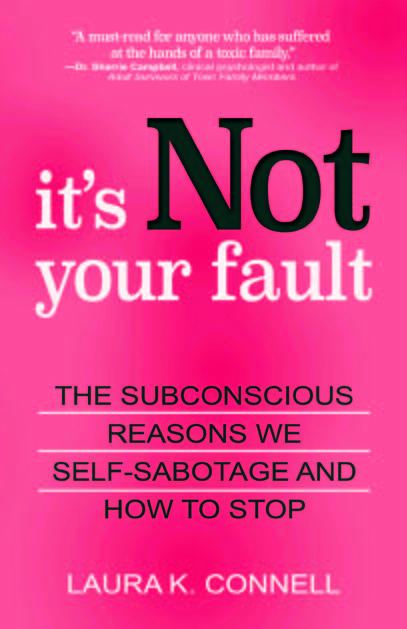Self-sabotage makes you feel like you’re your own worst enemy. But did you know that self-sabotage is a form of self-protection in disguise? The self-defeating behaviors that hold us back are often adopted in childhood as a way to cope with the pain of growing up without having our needs met. If we understood that our parents could not give us the care and attention we needed, we would find ways to take care of ourselves that became maladaptive as we got older. What are some of those ways?
Poor Boundaries
If you believed you would be punished or rejected for speaking up for yourself, you might adopt a people-pleasing personality. You felt the need to keep your parents happy at the expense of your own happiness. That’s because the threat of rejection or abandonment by a primary caregiver would have felt like life or death to you at that time. You were dependent on them to survive so staying in their good books was a solid survival strategy. That same fear of rejection gets extended to other people, even your social peers, when you’re an adult. So, although you’re no longer dependent on your parents or anyone else for your survival, you still experience the fear of rejection as a life-or-death situation. You will please someone else at the expense of yourself because it feels safer to do so.
Perfectionism
As a child, you may have gotten the impression that you had to be perfect to be loved. You attached your worthiness to your achievements rather than feeling worthwhile simply for who you are. This form of self-sabotage continues into adulthood and manifests in an intense inner critic who berates you at every turn. You may feel terrified of making mistakes and set unreasonably high standards for yourself. Perfectionism can prevent you from trying new things or putting yourself out there because you fear if it’s not perfect it’s not worth doing. This can contribute to procrastination and underachievement. Perfectionism makes you believe that you should do things right on the first try which is unrealistic. In reality, years and decades often go into achieving the excellence that perfectionists believe should come on their first attempt.
Unhealthy Coping Mechanisms
Sometimes we self-sabotage to deal with the pain of our unmet needs in childhood or avoid the emotions we had to repress. For example, if you had no one to support you or comfort you through your difficult feelings, you would push them down so you didn’t have to deal with them. Because we are human, we can only push our feelings down for so long before they rear their inconvenient heads. Without the skills to navigate these emotions, you would become afraid of them and try to run away from them. One way to avoid these emotions would be to distract yourself by numbing out with alcohol, drugs, or behaviors such as binge-watching TV, overeating, shopping to excess, or using pornography. You become dependent on these behaviors to help keep your feelings at bay and they prevent you from processing your emotions honestly. They also interfere with you living a healthy life and get in the way of you reaching your goals or enjoying true intimacy with a partner.
How to Stop Self-sabotage
So, how do you stop self-sabotage and feel like you’re on your own side instead of in your own way? It starts with understanding that you are not your own worst enemy. You developed an inner child who tried to keep you safe with these strategies that are no longer working for you. This inner child is trying to protect you the only way it knows how and that is through shortsighted measures like people-pleasing that it believes will keep you safe in the moment. The inner child is not looking out into the future and that is why these strategies often interfere with your long-range goals.
For example, if a feeling comes up that you never received support around, the child scrambles to stop you from experiencing that feeling using the coping mechanisms mentioned above. That’s why telling yourself to stop the behavior doesn’t work even though you know it’s bad for you. By the same token, setting boundaries with a parent will help you enjoy a healthier relationship in the long run. But your inner child will quickly drop that boundary to please your parent and avoid the dreaded rejection that might follow. The child wants to get through this one interaction safely, not do the work to create a boundary that may feel painful today but reap rewards down the line. It still experiences that threat of rejection as a life-or-death circumstance.
Instead of shaming the inner child for self-sabotage, acknowledge its efforts to protect you and keep you safe. Let the child know that you are in charge now and can take care of yourself because you’re an adult. Reassure it that you are capable and have access to resources that you did not have as a child. It is no longer the inner child’s job to run interference on your life. It’s important not to threaten to discard the child because that will make it hold on more tightly to its role. Give the child another job such as finding fun things for you to do, and this will help increase your joy in life.
 Laura K. Connell is a trauma-informed author and coach who helps her clients uncover blind spots that lead to relationship struggles and self-sabotage. She writes about healing dysfunctional family dynamics at her website laurakconnell.com.
Laura K. Connell is a trauma-informed author and coach who helps her clients uncover blind spots that lead to relationship struggles and self-sabotage. She writes about healing dysfunctional family dynamics at her website laurakconnell.com.
Her guest articles have further reached millions through personal development websites Life Hack, Pick the Brain, Dumb Little Man, Thought Catalog, Highly Sensitive Refuge, the anthology Chicken Soup for the Soul, and national newspapers The Globe and Mail and Toronto Star. She also hosts multi-speaker online retreats that attract over 3,600 attendees.




















